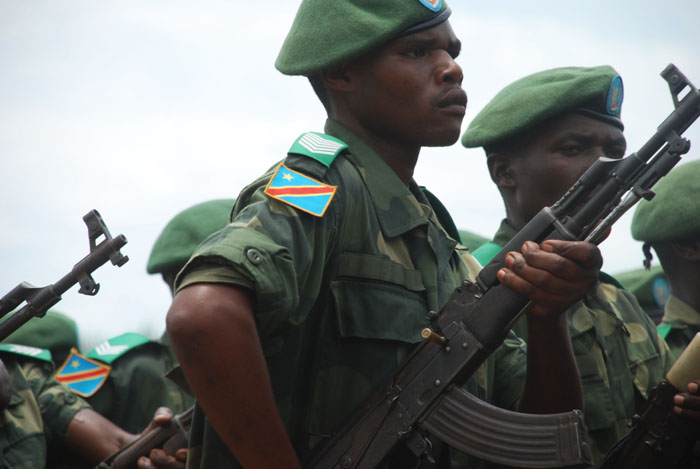
While it is not clear how serious the threats are, recent developments within and around the Congolese military are making Kinshasa’s ruling power nervous and are worth keeping an eye on.
First, there are rumors that the Congolese military is on the verge of splitting. Reportedly, the president’s circle is suspecting some military elements from the western parts of the Congo of having allied themselves with Kinshasa’s neighbor to the north, Congo-Brazzaville. Military units from the western region are believed to be colluding with the former Air Force Chief of Staff of the Democratic Republic of Congo, General Faustin Munene, who is accused of having masterminded a failed coup in Kinshasa more than a year ago and who has been in hiding in Congo-Brazzaville.
Because of the long-brewing discontent among western elements of the armed forces for having lost out on the ex-CNDP’s takeover of the army and police command across eastern Congo, the ruling power’s concern these days is that western elements would easily switch sides to join in Munene’s forces—soldiers that Etienne Tshisekedi is rumored to rely upon, according to an influential ex-CNDP officer. Fears of a coup could be behind the recent army reshuffling and the strong deployment of Munene’s former belligerents, the ex-CNDP troops from the East, to Kinshasa.
Second, there are fears of a rebellion. General Munene left Congo in October 2010 to allegedly link up with the thousands of former officers and soldiers of the “Forces Armées Zaïoises,” the army that was loyal to deposed dictator Mobutu Sese Seko. Munene is also suspected of having struck an alliance with the current Congolese army Chief-of-Staff, General Didier Etumba.
Etumba has reportedly resisted forceful resignation by President Kabila, who accused him of siding with subversive groups. Before electoral campaigns began on October 28, Etumba reportedly posed in photos with people later suspected of beating the Senate’s president Léon Kengo Wa Dondo on New Year’s Eve in Paris, according to sources in the presidency’s intelligence services. The groups are believed to be led by a longtime opponent of Kabila’s regime, Honoré Ngbanda, who fled to France after Mobutu’s regime was toppled in 1997.
Third, since the beginning of the year, self-proclaimed president Etienne Tshisekedi has reportedly started promising to soon pay $150 to all military elements, no matter what the rank. The lack of salary for soldiers is a serious problem in the Congo. As recently as January 9, two army brigades in Bukavu, South Kivu protested a more than a three-month pay delay. Three soldiers and two civilians were injured. Given the destitution of many soldiers, it is not unlikely that some military elements could be motivated by the promise of pay to shift their loyalty to Tshisekedi – a scenario certainly worrisome to President Kabila as he begins his new five-year term amid ongoing tension over organized massive fraud cases.
Sarah Zingg Wimmer contributed to this post.
Photo: A Congolese soldier marches in a parade (Enough / Laura Heaton)

